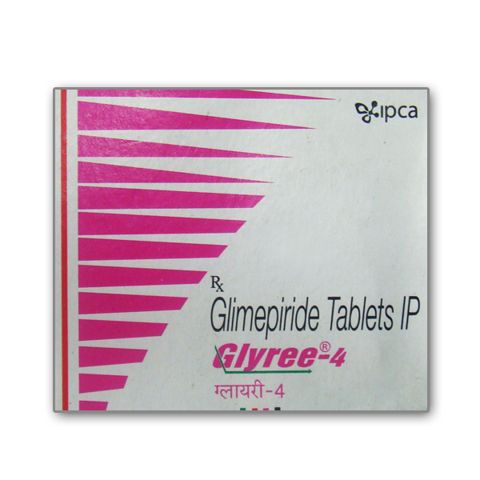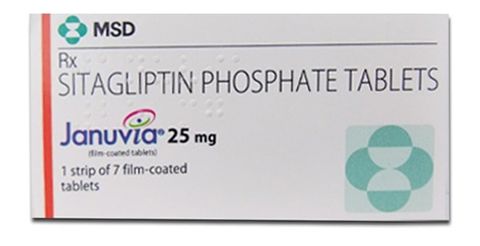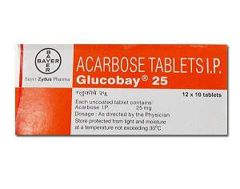Glypride 4mg
Glypride 4mg (Glimepiride) is an oral antidiabetic medication designed to effectively manage Type 2 diabetes. As a sulfonylurea, it stimulates pancreatic beta cells to enhance insulin secretion, ensuring optimal blood sugar control. With a once-daily dose, it helps prevent hyperglycemia while promoting metabolic stability.
Patients must monitor for hypoglycemia, dizziness, or weight gain. It is unsuitable for Type 1 diabetes or ketoacidosis. Caution is advised for those with liver or kidney disorders. When paired with a healthy lifestyle, Glypride 4mg empowers individuals to achieve balanced glucose levels and long-term diabetes management.
Uses
- Type 2 Diabetes Mellitus Management – Helps lower blood sugar levels by increasing insulin release.
- Prevention of Diabetes Complications – Reduces the risk of nerve damage, kidney disease, vision problems, and heart issues.
- Blood Sugar Regulation – Works best when combined with a proper diet and exercise regimen.
- Insulin Sensitivity Improvement – Enhances the body's response to insulin for better glucose utilization.
How to Use Glypride 4mg (Glimepiride) ?
- Dosage – Take once daily, usually before or with breakfast or your first main meal, as prescribed by your doctor.
- Swallow Whole – Do not crush, chew, or break the tablet. Take it with a glass of water.
- Consistency Matters – Take it at the same time every day for best results.
- Monitor Blood Sugar – Regularly check your glucose levels to avoid hypoglycemia (low blood sugar).
- Follow Diet & Exercise – Combine with a healthy diet and regular physical activity for optimal diabetes control.
How Glypride 4mg (Glimepiride) Works ?
Glypride 4mg contains Glimepiride, a sulfonylurea class drug that helps lower blood sugar levels in Type 2 Diabetes. It works through the following mechanisms:
- Stimulates Insulin Release – It activates pancreatic beta cells, increasing insulin secretion, which helps move glucose from the blood into the cells.
- Enhances Insulin Sensitivity – Improves how effectively the body’s cells respond to insulin, aiding in better glucose utilization.
- Reduces Liver Glucose Production – Helps decrease the liver's release of extra glucose into the bloodstream.
Dosage
Usual Dosage for Adults (Type 2 Diabetes):
- Starting Dose: 1 mg once daily before or with breakfast (or the first main meal).
- Maintenance Dose: Gradually increased by 1 mg at intervals of 1-2 weeks based on blood sugar levels.
- Maximum Dose: 8 mg per day (should not be exceeded).
Dosage Adjustments:
- For Elderly or Patients with Kidney/Liver Issues: Lower starting doses (e.g., 1 mg/day) are recommended.
- Missed Dose: Take it as soon as remembered. If it's close to the next dose, skip it—do not double dose.
Benefits of Glypride 4mg (Glimepiride):
- Effective Blood Sugar Control – Helps lower and maintain stable glucose levels in Type 2 diabetes.
- Reduces Diabetes Complications – Lowers the risk of nerve damage, kidney disease, heart problems, and vision loss.
- Enhances Insulin Secretion – Stimulates the pancreas to release more insulin, improving glucose utilization.
- Convenient Once-Daily Dosing – Simplifies diabetes management with a single daily dose.
- Improves Insulin Sensitivity – Helps the body use insulin more efficiently, reducing insulin resistance.
- Supports Long-Term Diabetes Management – Works best when combined with a healthy diet and lifestyle.
Side Effects
Common Side Effects:
- Hypoglycemia (Low Blood Sugar) – Symptoms include dizziness, sweating, confusion, and shakiness.
- Weight Gain – Can cause slight weight increase due to increased insulin activity.
- Nausea or Stomach Discomfort – May cause mild digestive issues like bloating or diarrhea.
- Dizziness or Headache – Can occur, especially if blood sugar drops too low.
Rare but Serious Side Effects:
- Severe Hypoglycemia – If untreated, can lead to unconsciousness or seizures.
- Liver Problems – Signs include yellowing of the skin/eyes (jaundice) and dark urine.
- Allergic Reactions – Rash, itching, swelling, or difficulty breathing.
- Blood Disorders – Rare cases of anemia or reduced white blood cells.
Precautions
Glypride 4mg should be taken with food to prevent hypoglycemia. Regular blood sugar monitoring is essential. Elderly patients and those with liver or kidney disease require dose adjustments. Pregnant or breastfeeding women should consult a doctor before use.
Avoid alcohol, as it increases the risk of severe hypoglycemia. Do not skip meals, and follow a healthy diet and exercise plan. Caution is advised when using other diabetes medications to prevent low blood sugar. Always follow medical guidance for safe use.
frequently asked questions
How does Glypride 4mg work?
Glypride 4mg (Glimepiride) stimulates the pancreas to release more insulin, helps the body respond better to insulin, and reduces liver glucose production, effectively lowering blood sugar levels in people with Type 2 diabetes.
How should I take Glypride 4mg?
Take once daily, before or with your first main meal. Swallow the tablet whole with a glass of water. Do not crush or chew it. Always follow your doctor’s instructions.
What are the common side effects?
Common side effects include hypoglycemia (low blood sugar), dizziness, headache, nausea, and weight gain.
Can I take Glypride 4mg with other diabetes medications?
It may interact with other medications, so inform your doctor about all the drugs you are taking. Combining it with certain medications may increase the risk of hypoglycemia.
What should I do if I miss a dose?
Take the missed dose as soon as you remember, unless it's close to the next dose. Do not double the dose to make up for a missed one.
Can I drink alcohol while taking Glypride?
It’s best to avoid alcohol, as it can increase the risk of severe hypoglycemia. Always check with your doctor before consuming alcohol.
Who should not use Glypride 4mg?
It is not suitable for people with Type 1 diabetes, diabetic ketoacidosis, or severe kidney or liver disease. Always consult a doctor before starting the medication.
Conclusion
Glypride 4mg (Glimepiride) is an effective medication for managing Type 2 diabetes by stimulating insulin release and improving the body's response to insulin. It helps lower blood sugar levels when combined with a healthy diet and exercise.
However, it's essential to monitor blood sugar levels, avoid alcohol, and follow your doctor’s instructions. With proper use, it can significantly support long-term diabetes management while minimizing risks and complications.
Your review is submitted successfully. It will be live after approval, and it takes up to 24 hrs.







